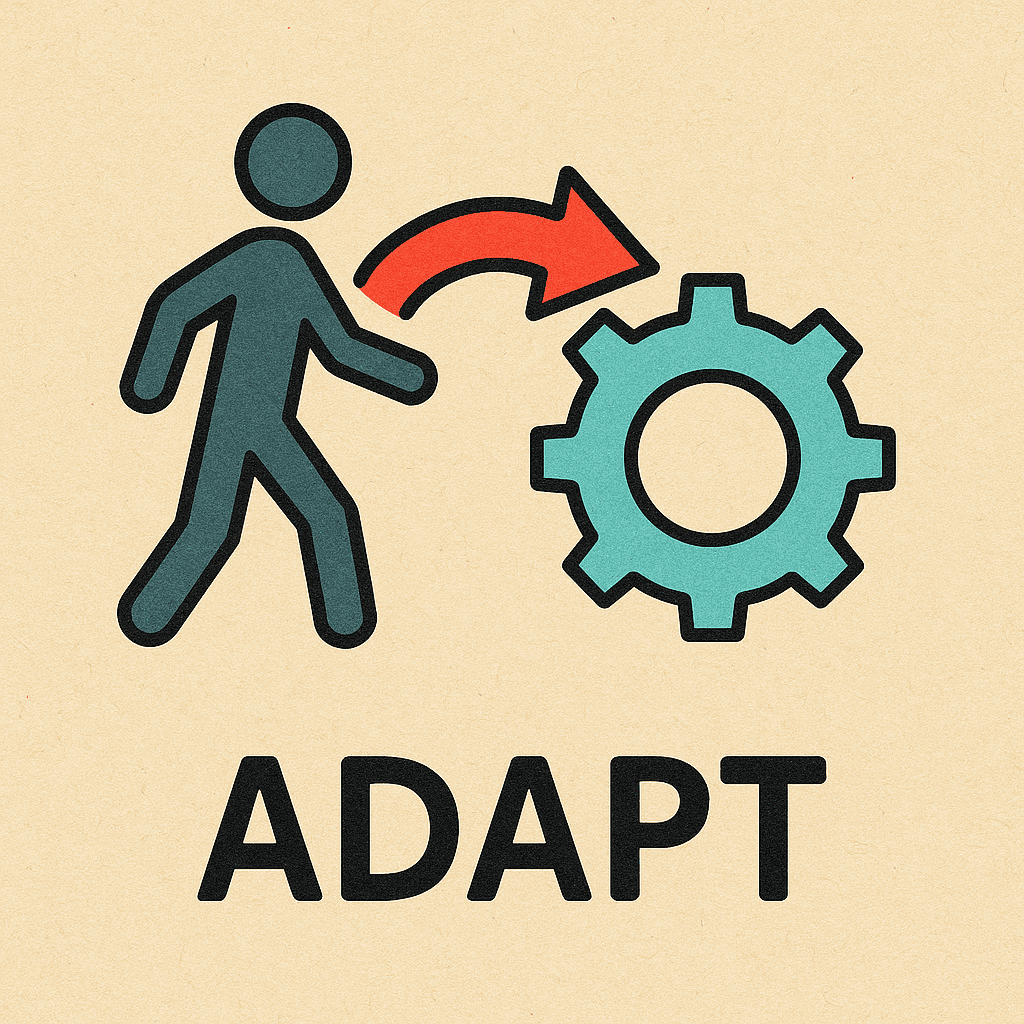Adapt to + situation/environment (adjust to new conditions)
This is the most common usage: becoming accustomed to a new situation, place, or change.
- She quickly adapted to her new school.
- He struggled to adapt to the climate.
- The company must adapt to market changes.
- We need to adapt to the digital age.
- Children usually adapt to new surroundings easily.
- He couldn’t adapt to city life.
- The team had to adapt to the coach’s style.
- Plants adapt to their environment.
- Soldiers must adapt to difficult conditions.
- Immigrants often adapt to a new culture.
👉 Widely used in daily life, business, and social contexts.
Adapt for + purpose (modify for use)
Here, adapt means to modify something so it works for a different purpose.
- The novel was adapted for the screen.
- He adapted the room for an office.
- The book was adapted for children.
- The story was adapted for television.
- They adapted the curriculum for online learning.
- The design was adapted for mass production.
- The software was adapted for mobile devices.
- The house was adapted for wheelchair access.
- The novel was adapted for a play.
- The program was adapted for international students.
👉 Frequent in education, technology, and media.
Adapt (oneself) (reflexive use – adjust personally)
This usage emphasizes personal flexibility and self-adjustment.
- She adapted herself to the new role.
- He quickly adapted himself to life abroad.
- She had to adapt herself to working at night.
- He tried to adapt himself to the new system.
- She adapted herself to the group’s pace.
- He adapted himself to the new rules.
- She learned to adapt herself to change.
- He had to adapt himself to the culture.
- She adapted herself to the difficult situation.
- He adapted himself to the audience.
👉 More formal or literary; less common in spoken English.
Adapt + object (to modify/change something)
Here, adapt means to make changes to something so it works better.
- Engineers adapted the machine for faster production.
- The school adapted the program to suit students’ needs.
- They adapted the software to run on Linux.
- The teacher adapted the lesson for online use.
- The team adapted the strategy to fit the opponent.
- The architect adapted the plan to the site conditions.
- The writer adapted the text for beginners.
- They adapted the car for racing.
- The chef adapted the recipe for vegetarians.
- The coach adapted the training to players’ abilities.
👉 Common in technical, creative, and problem-solving contexts.
Adaptation in passive form (be changed)
Often used when something is modified by others.
- The novel was adapted into a movie.
- The curriculum was adapted for online learning.
- The machine was adapted for industrial use.
- The story was adapted for radio.
- The software was adapted for smartphones.
- The house was adapted for disabled people.
- The law was adapted to modern society.
- The design was adapted for new technology.
- The play was adapted from a real story.
- The method was adapted for students with disabilities.
👉 Passive voice is very common with films, books, and media.
Scientific / biological sense (evolve, adjust)
In biology, adapt means to change over time to survive.
- Animals adapt to their environment.
- Species adapt to survive.
- Fish adapt to deep-sea pressure.
- Birds adapt to climate change.
- Plants adapt to desert conditions.
- Bacteria can adapt to antibiotics.
- Polar bears adapt to Arctic life.
- Insects adapt to pesticides.
- Humans adapt to high altitudes.
- Microbes adapt rapidly to changes.
👉 A scientific/academic usage in biology and ecology.
General, figurative usage (flexibility / adjusting)
This group shows adapt in broader, metaphorical senses.
- Successful people adapt quickly.
- Leaders must adapt to change.
- He couldn’t adapt fast enough.
- You must adapt or fail.
- Businesses need to adapt constantly.
- She adapted her approach.
- He adapted his behavior to the situation.
- They adapted their goals.
- The project must adapt to reality.
- He adapted his speech for the audience.
👉 Very common in business, motivation, and personal development.
Summary
✅ In summary, adapt has several main usages:
- Adapt to = adjust to environment/conditions.
- Adapt for = modify something for a purpose.
- Adapt oneself = personally adjust (formal).
- Adapt + object = change/modify something.
- Passive adapt = often for books/movies.
- Scientific adapt = evolutionary/biological change.
- General adapt = flexibility, problem-solving.
